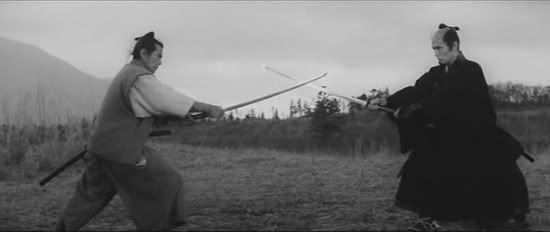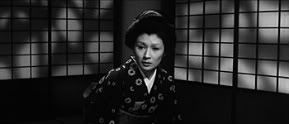|
Samurai
Rebellion |
|
Synopsis Analysis Most directors wallow in extremes of sentimentality and rely on a handful of hackneyed devices in their attempts to convey the emotions of their characters. In Samurai Rebellion Kobayashi demonstrates that a skilled film maker can produce the strongest feelings in the heart of the viewer with the simplest and most restrained techniques. In a few brief, austere scenes he evokes the love Yogoro and Ichi share, and without wailing dialogue, furrowed brows, slow motion photography, pathetic music, or any other excess he causes the viewer to feel the terrible sorrow they suffer because of the selfishness of their lord. Even when Kobayashi does employ some technical device, such as the use of still frames during his depiction of Ichi's retelling of the events which led to her angering her lord, that device, thanks to the director's considerable talent, adds to the scene's emotional resonance. What is more, the movie's deliberate pacing is absolutely perfect throughout. There is never a moment that is cut too short or prolonged too long. As he unfolds the story, Kobayashi is consequently able to develop, gradually and effectively, the viewer's awareness both of the characters' emotions and of the world in which they live, with all its constraints and realities, and to arouse, incrementally, a deeply felt sense of tragedy. Throughout the development of this sad tale, the formality and grace of the characters' actions give them an almost dancelike beauty. The director is skillful enough that even the film's stillness, which he poignantly manifests in his frequent depictions of carefully arranged seated figures in austere rooms, contributes to its elegant fluidity and affecting intensity. Every scene presents the viewer with a precisely composed tableau, each of which complements both those that preceded and those that follow it so that the whole of the movie flows like a quiet, intense emotional dance. It is absolutely bewitching. Fortunately, the cinematography used to capture this vision is invariably lovely and enhances the emotive impact of each scene. The film is, in fact, filled with one gorgeous image after another, which so intoxicate the viewer that he is able to submerge himself in another age and experience the troubles and sorrows of its inhabitants as though they were his own. As beautifully realized as is the director's fictional universe, it is made even more involving, and is charged with even greater emotional intensity, as a result of the actors' consistently accomplished work. Tohsiro Mifune's performance is a real delight. His loyal, decent, and brave character is unhappy in his own marriage but rejoices in the happiness he sees his son and daughter-in-law sharing and loves his granddaughter dearly. The actor, without any histrionics, is able to convey the depth with which his character experiences these various emotions and gives the man a real life. The other actors all acquit themselves well, but none equal Mifune. Yoko Tsukasa does, however, come close. Sadly, despite all the movie's numerous virtues, I must concede that the conclusion of Samurai Rebellion is deeply flawed. In fact, it is both overdone and entirely too long. Much of the impact of the film is, consequently, dissipated in its final moments. That said, whatever its weaknesses, the movie is, for most of its duration, so brilliantly crafted that it is still an impressive work of art. In fact, there are very few films as evocative of a profound sorrow as is Samurai Rebellion. It is a marvelous, beautiful, and tragic masterpiece. Review by Keith Allen
Home Page / Alphabetical List of
Films © 2004
movierapture@hotmail.com Keith
Allen. All rights reserved. |









